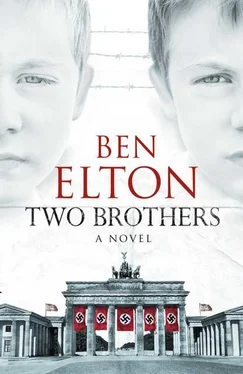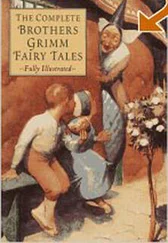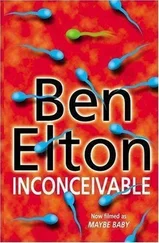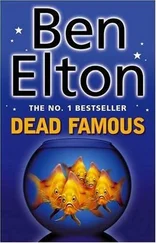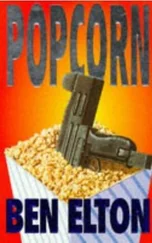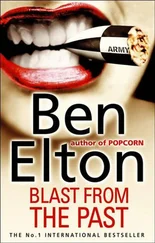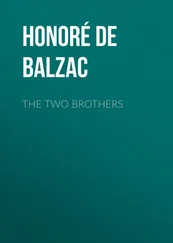‘Of course I do. Happy to be useful,’ Stone said. ‘I wouldn’t want you to like me for any other reason. How about you put that stuff on after you have your coffee? It’s hell to get off the rim of the cup.’
‘Too late,’ she replied, pressing a tissue to her scarlet lips and then pushing the tissue into the breast pocket of Stone’s jacket, which was hanging over the back of the high-backed stool on which she was perched. ‘Something to remember me by in the week, eh? Haha!’
Stone would not have blamed her if truly she did only like him for the convenience of his apartment. He certainly did not consider himself much of a catch, fourteen years older than her and in love with a memory. He was aware that women sometimes found him attractive although never understood why, but Billie could do so much better. She was clever and wonderfully stylish, positively lighting up his drab little kitchen in her smart pink woollen two-piece suit with its pencil-line skirt and matching beret perched atop a stiff, jet-black Marilyn Monroe perm. And such a wonderful smile. A huge smile, it seemed almost to sparkle simply with a love of life.
He poured the coffee. Watching her as she busied herself packing her student bag. Pencils, paper, books of photography borrowed from the library and a swatch of fabrics which, even as she put it in her bag, she couldn’t resist caressing, her slim fingers slipping sensually across the fabric, appreciating its qualities.
‘Opposites attract,’ she said suddenly, as if reading his thoughts. ‘I like quiet boys. Means I got no competition bein’ centre of attention.’
Then she drained her coffee, slung her bag over her shoulder and made for the door, the piece of toast with Cooper’s Oxford marmalade Stone had just made for himself clamped firmly between her teeth.
‘So see you next weekend,’ she said through the toast. ‘Maybe come to mine. Mum’s doin’ pork, stir-fried up wi’ ginger an’ spice. You’re welcome if you want.’
‘I don’t really eat pork. Don’t know why. We did when I was a kid.’
‘You’ll eat it when me Ma cooks it.’
‘Yeah. I’ll bet I would. But I’ll be gone at the weekend, I’m afraid. Remember? I told you, I’m going to Berlin.’
‘Oh yeah, dat’s right. The long-lost girlfrien’ eh? Haha! Good luck!’
‘She was my brother’s girlfriend.’
‘Yeah, an’, man, didn’ dat hurt!’
Stone had never told Billie anything about his feelings for Dagmar but he supposed it was pretty obvious. Women tended to know these things.
‘I’ll bring you back some sweet pretzels,’ he said.
‘No t’anks. On a diet. But if you pass a bookshop see if you can find somet’ing on Bauhaus for me. Don’t matter if it’s in German, it’s the photos I love. Give me a call when you get back. That’s unless you’re all tied up wit’ your brudder’s girlfriend.’
‘I’m free tonight,’ Stone said without thinking. ‘We could have dinner.’
‘Can’t. I’m modellin’ for the art students. They love me, let me tell you. They t’ink I’m exotic. I say to ’em, jus’ wait till there’s a few million more of me brothers an’ sisters gettin’ off de boat. We won’ be so damned exotic then. Haha. Dat made ’em t’ink.’
And with a click-clack of stiletto heels, Billie was gone.
Funny how she did life modelling.
Just a coincidence. But it was a nice one. A connection to his mother, like the club in which he had met her was a connection to his father.
Stone took his coffee into the little sitting room of his apartment. The statuette stood on the mantelpiece above the gas fire. He took it up and held it in his hand.
Running his fingers along its smooth, satisfying lines. Was there something slightly wrong about him fondling a likeness of his naked mother? he wondered. Perhaps Freud would have had something to say about it.
A part of Stone hated that figure. He hated it because of who had created it. But he loved it more. Because it was his mother. Frieda, sculpted in the first year of Stone’s life, just before he had become fully conscious of her. Twenty-two years old, naked in the full bloom of youth. His grandfather had bought the piece and it had stood in their apartment all through his childhood and youth. It had still been standing there in 1946 when his German agent had collected up what family possessions were left prior to the sale of the apartment and sent them on to Stone in London.
He wondered how many good Nazis had fondled that statue in the years when some unknown family had squatted like murderous cuckoos in his parents’ home. How shocked those thieves would have been to understand that they were caressing the likeness of a Jew. There had no doubt been a Nuremberg Law against that sort of thing — no pure German will caress the likeness of a Jew as defined by the model having had one or more Jewish grandparents .
His father had hated that statuette.
Stone smiled as he recalled Wolfgang Stengel’s intense, semi-comical exasperation when anyone admired it.
It defied every artistic principle Wolfgang Stengel had possessed. Boring realism, nothing but boring realism, he’d protest. Which was why of course Stone and his brother had loved it then and why Stone loved it still. Precisely because it was boring realism, and skilfully executed too. A passable impression of his beloved mother. Not as beautiful as she had been but beautiful nonetheless.
For a moment Stone held the statue by the head.
Held it as he had held it on that awful night.
Knuckles gripped white round it.
The marble base crimson with blood.
He saw again the water running over it, washing the red away. The blood gurgling down into the sink as he and his brother began frantically to cover up the evidence of what they had done.
Too Much Jazz
Berlin, 1923
THE JOINT, AS Tom Taylor happily remarked, was jumping.
‘This band is on fire,’ he shouted from behind his kit. ‘They don’t got no better in New York City.’
Wolfgang was trying out a new piano player, a Russian émigré called Olga, an ex-duchess or princess of some sort, or so she claimed. But then all the Russian refugee girls thought they were Grand Duchess Anastasia, so she might just as easily be the daughter of some semi-literate farmer who owned one too many cows and so got a bullet in exchange for his field. Not unnaturally, Olga loathed Wenke, the Communist clarinettist, and the feeling was fully reciprocated.
Wolfgang enjoyed the tension.
‘We can’t all be friends. It’s bland. A bit of conflict’s good for the minor keys,’ he said. ‘It really puts some bite into Wenke’s atonal riffing.’
‘I would like to see a crazed dog put some bite into Wenke’s atonal arsehole,’ Olga spat through her cigar smoke.
‘Just keep playing, princess,’ Wenke snarled into his clarinet, ‘you can’t run for ever. The revolution’ll catch up with you in the end, then there’s a lamp-post waiting for you just outside in the street, you damned kulak.’
‘You bloody sauerkraut Reds!’ Olga sneered from her piano stool. ‘You’ll never have a revolution. You won’t fart unless Moscow sends you written permission. Here’s to Lenin’s fourth stroke! They say he can’t talk any more. Give me a call when the bastard can’t fucking breathe either, I’ll buy drinks all round!’
Olga spat on the floor and raised a glass of vodka mixed with pepper provocatively in Wenke’s direction. Wolfgang decided to kick into the next number before the two musicians came to blows.
‘This one’s brand new and straight off the boat,’ he called out over the general din. ‘I think you’re going to love it as much as we do, it’s by the great American Negro composer Jimmy Johnson of New Jersey and it’s called the Charleston .’
Читать дальше
